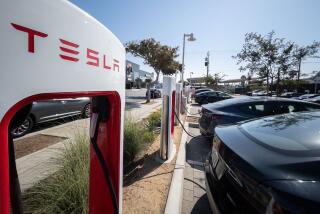Tesla begins taking orders for its solar roof
Tesla’s high-design solar roofs are moving a step closer to a housetop near you.
Tesla Inc. is accepting orders for its electricity-generating roofs, with a Wednesday afternoon kickoff.
Chief Executive Elon Musk teased the announcement on Twitter early Wednesday, saying deployment in the U.S. would begin this year and overseas delivery and installations would start in 2018.
He added that his company’s solar glass roofs could be purchased for homes nearly anywhere in the world.
Homeowners will need to pay $1,000 to reserve a spot on the order list.
A typical homeowner looking to replace a 3,000-square-foot roof with the solar roof could expect to pay about $21.85 per square foot, Tesla said. That price doesn’t include tax credits and applies to a roof that is 35% covered with electricity-generating tiles.
The roofs are a mix of non-generating tiles and solar tiles, which cost more, though both tiles look identical, Tesla said.
Musk said during a call with reporters Wednesday that the roofs could be made up of as much as 70% active solar tiles, though most houses would have about 40%.
Musk said the solar glass tiles will be lighter and stronger than normal roof tiles, and that the roofs will come with a warranty that extends either to the lifetime of the house or to “infinity” — whichever comes first.
“I’m confident this is a compelling financial decision,” Musk said on the call. “We want to look around at neighborhoods and see roofs that are beautiful and generate energy from the sun.”
Palo Alto-based Tesla has a calculator on its sales site where prospective customers can input their address and see the cost of the roof and the amount of money it is expected to generate in energy over 30 years. The calculator includes the amount of tax credits customers could receive as well as the cost of a Tesla Powerwall storage battery.
The electricity generated from the solar roof can be stored using the Powerwall battery so that it can power a home when the sun isn’t shining.
Customers can use a slider to determine how those figures would change depending on what percentage of the roof would be covered in active solar tiles.
Tesla said it will take about five to seven days to install the roof, in line with typical roof installation times.
Musk unveiled the line of high-design, solar power-generating roof tiles last fall in an event at Universal Studios Hollywood.
The goal has been to branch out to untapped consumers who have shown an aversion to the boxy solar panels that attach to rooftops.
Although more solar power was brought online nationwide last year than any other source of electricity, the pace of rooftop solar installations — the focus of residential and business customers — dropped dramatically compared with the sizzling growth in 2015.
Rooftop solar growth dropped to 19%, down from a 63% average increase year-over-year from 2012 to 2015. The rooftop solar industry has been working to retool its operations by coupling solar panels with battery storage to offer consumers increased independence from their utility companies.
Initially, only gray smooth and textured black glass tiles will be available for purchase. Tuscan and French slate options will come in 2018, according to Tesla.
Tyler Ogden, solar analyst with Lux Research, said the roof tile options could be attractive for customers who may have shied away from traditional solar panels’ decidedly unaesthetic appearance. The company’s biggest opportunity could be in the construction market, where it could look to partner with construction firms to install roofs on new homes.
But ultimately, demand for the product will depend on the amount of savings for the homeowner, Ogden said, and how Tesla packages the cost of the system to prospective customers.
Electric car maker Tesla Motors Inc. bought solar panel firm SolarCity last year, making the combined company, now known as Tesla Inc., a one-stop shop for clean energy.
Other companies have sought partners to create similar offerings.
A more diverse portfolio of products from the rooftop solar industry comes as incentives are set to decline.
The federal government is phasing out a 30% federal tax credit for solar installations. The credit will decrease to 26% in 2020 and 22% in 2021. After 2021, the residential credit drops to zero and the commercial and utility credit will become fixed at a permanent 10%.
Twitter: @smasunaga, @ivanlpenn
ALSO
3 things we just learned from Elon Musk about Tesla’s Model 3
A quick guide to Elon Musk’s new brain-implant company, Neuralink
Elon Musk says Tesla semi truck to debut in September, kicking clean-truck race into high gear
UPDATES:
2:15 p.m.: This article was updated to include comments from an analyst.
1 p.m.: This article was updated to include more details about the solar roofs and information about the state of the solar installation industry.
This article was originally published at 11:35 a.m.








